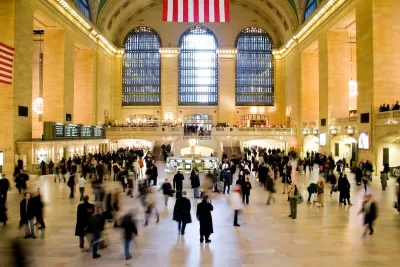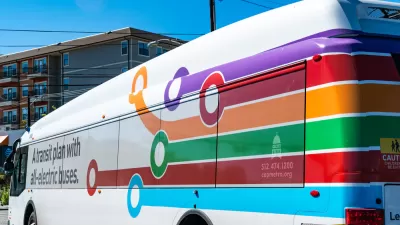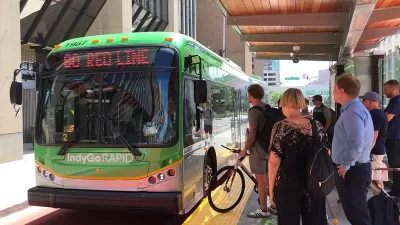Jarrett Walker calls for a more social approach to transit planning.

In an excerpt from his book, Human Transit, Revised Edition: How Clearer Thinking about Public Transit Can Enrich Our Communities and Our Lives, published in Next City, Jarrett Walker argues that American individualism is harming the nation’s public transit systems.
Using a quote from Elon Musk as an example, Walker notes that “With adequate funding and in the context of good city planning, public transit can do all of these things for vast numbers of people, though not for everyone and possibly not for Elon Musk.”
In fact, the way transit forces you to interact in some small way with strangers is one of its strengths. “At its most successful, a transit system’s ridership is as diverse as the city or community it serves. It’s full of all kinds of people making all kinds of trips, all being a bunch of random strangers to each other.”
When transit agencies struggle to create specialized services for various groups of people, the system as a whole can suffer from inefficiency. Walker recommends that, instead of considering user groups separately, “we must think of patterns that many different people will find useful, so that all those people end up on the same vehicle, sharing the expensive time of a single driver.” The diversity of a transit system’s ridership, for Walker, is indicative of its success.
FULL STORY: Individualism Is Making Public Transit Worse

Planetizen Federal Action Tracker
A weekly monitor of how Trump’s orders and actions are impacting planners and planning in America.

Restaurant Patios Were a Pandemic Win — Why Were They so Hard to Keep?
Social distancing requirements and changes in travel patterns prompted cities to pilot new uses for street and sidewalk space. Then it got complicated.

Maui's Vacation Rental Debate Turns Ugly
Verbal attacks, misinformation campaigns and fistfights plague a high-stakes debate to convert thousands of vacation rentals into long-term housing.

In California Battle of Housing vs. Environment, Housing Just Won
A new state law significantly limits the power of CEQA, an environmental review law that served as a powerful tool for blocking new development.

Boulder Eliminates Parking Minimums Citywide
Officials estimate the cost of building a single underground parking space at up to $100,000.

Orange County, Florida Adopts Largest US “Sprawl Repair” Code
The ‘Orange Code’ seeks to rectify decades of sprawl-inducing, car-oriented development.
Urban Design for Planners 1: Software Tools
This six-course series explores essential urban design concepts using open source software and equips planners with the tools they need to participate fully in the urban design process.
Planning for Universal Design
Learn the tools for implementing Universal Design in planning regulations.
Heyer Gruel & Associates PA
JM Goldson LLC
Custer County Colorado
City of Camden Redevelopment Agency
City of Astoria
Transportation Research & Education Center (TREC) at Portland State University
Jefferson Parish Government
Camden Redevelopment Agency
City of Claremont





























